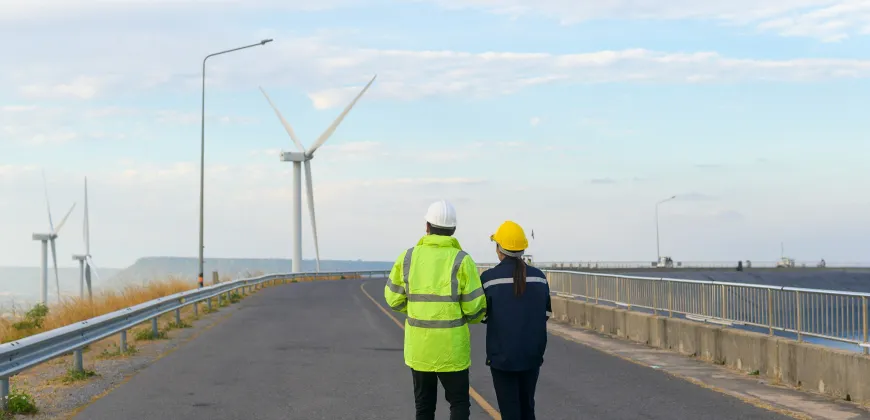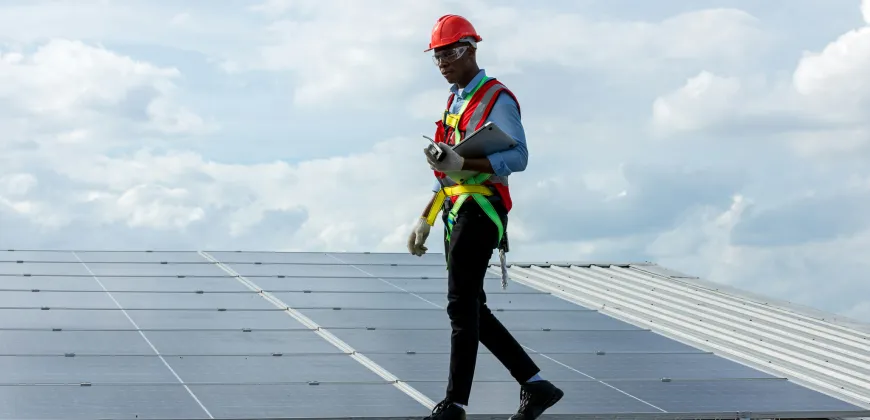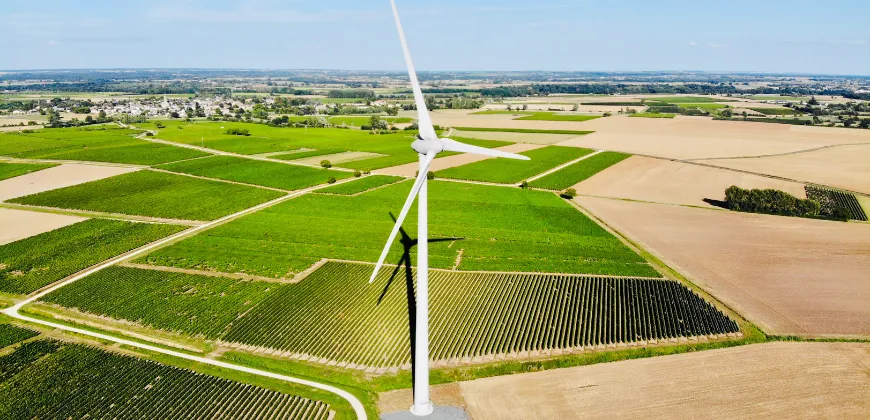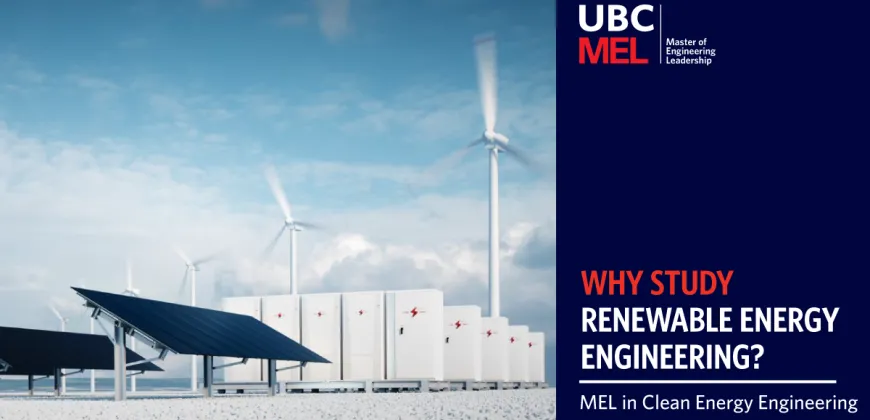Energy engineers' role in advancing sustainable solutions

Energy engineers are at the forefront of the sustainable energy movement, playing a pivotal role in advancing solutions that are environmentally friendly and economically viable. Across the world, the demand for professionals in this field is growing rapidly as industries and countries embark on the energy transition needed to reach ambitious carbon emission targets.
Sustainable energy in Canada
Canada has set net-zero emissions targets for 2050, which is prompting the decarbonization of all industry sectors.
While the country has historically been known as a major producer of oil and gas, Canada is increasingly making the shift to renewable energy, which accounted for 17% of energy supply in 2022, according to the federal government. Renewable energy uptake varies across the country, with some provinces, like BC, benefiting from its hydro resources, whereas other provinces are more reliant on fossil fuels.
Yet even in BC, where close to 96% of energy is sourced from renewable sources like hydro, biomass and wind, there is still a pressing need to decarbonize.
Greenhouse gas emissions have declined since the baseline year of 2007, but at nowhere near the amount required to reach 40% reduction targets by 2030, 60% by 2040 and 80% by 2050 according to the CleanBC Plan. Other provinces – and countries – face an even greater challenge given their reliance on energy generated from fossil fuels.
The role of sustainability professionals
The transition to renewable energy sources – such as wind, solar, tidal and biofuels and renewable natural gas – will not be easy. There are technical issues to consider, as well as barriers of cost, reliability, implementation and uptake.
A new kind of professional is needed to guide the transition to sustainable energy in Canada. Top employers from the private and public sector are looking for people with strong knowledge of technical fundamentals. They need people with technical expertise who understand renewable energy technologies, energy storage, distribution networks and energy management. Individuals who have the communication and negotiation skills to help different levels of government, stakeholders, communities and industry find common ground and sustainable paths forward will also be in high demand.
What’s needed are energy engineers who are visionary leaders, strong communicators and innovative problem-solvers. Many of the technical issues involved in generating renewable energy are relatively well understood.
What’s harder is the scale-up and widespread adoption and implementation – tasks that require a different set of skills. This has opened up exciting opportunities for professionals who combine technical engineering expertise with powerful people skills. Similarly, there’s a pressing need for people who understand policy and its role in shifting individual and organizational behaviour to align with energy-efficiency and clean energy goals.
A master’s degree in sustainable energy
The comprehensive curriculum for the MEL in Clean Energy Engineering was designed for early and mid-career professionals who want to gain the wide-ranging knowledge needed to work at the forefront of the sustainable energy transition.
“There are so many career paths available in this field, from energy storage, renewable energy systems and carbon capture to energy policy and low carbon buildings,” says alumni Daniel Stauft.
“As I was researching academic programs, the MEL in Clean Energy Engineering stood out because it provides a full suite overview of all these areas. It fit my professional goals of wanting to learn about these different areas of practice before deciding which I wanted to pursue in my career,” Daniel adds. The curriculum covers a range of energy system topics, grounded in practical examples, projects and case studies.
“Once we’ve covered the basics of different renewable energy systems, we can dive into case studies and explore the interconnections and real-world challenges at the intersection of energy storage, sustainable energy systems, policy and economics,” explains Program Director Vladan Prodanovic.
Students benefit from the program’s close connection to industry partners. In addition to industry-led workshops and events held on campus, students have opportunities to visit some of British Columbia’s leading innovators in the field. One year, for example, students went on a four-day trip to Vancouver Island to visit renewable energy projects and meet with clean energy leaders.
“It gave me some ideas about future avenues I might like to explore, including working with remote communities,” says 2023 alumni Aigerim Akiltayeva, who has more than eight years of experience in the clean energy and sustainability fields.
“I would love to use my knowledge to help communities move away from diesel power and to have a significant impact on emissions and quality of life, rather than the more incremental impact you might have working in other areas. It also gave me valuable insights into advancing urban low-carbon development by integrating renewable energy sources into the grid operation."
Sustainability engineers in high demand
Clean energy engineers are sought after across the world. In its January 2024 report Renewing Talent in the Renewables Sector, Deloitte noted that there is a significant gap between job postings and talent, with the number of postings far exceeding supply. This is a theme that plays out globally and locally. “Many graduates of this program are hired as energy managers,” says Dr. Tony Bi, who teaches the energy system fundamentals course and is director of UBC’s renowned Clean Energy Research Centre.
“In BC, for example, the provincial government has mandated that every sector has a decarbonization plan, and our students are highly in demand to apply their skills to help organizations and municipalities identify their overall decarbonization potential and advise on strategies to reach those goals,” Dr. Bi adds.
This translates into growth opportunities. Vancouver-based Solaris hired its first MEL in Clean Energy Engineering grad in 2021 and has since hired eight more. Like other top employers, Solaris appreciates the blend of technical and business skills that MEL grads bring to the table. Leaders at the firm say they are looking for professionals who are familiar with the latest industry developments and who can support the consulting company’s clients that are pursuing decarbonization strategies. "New MEL hires have extremely important soft skills on the leadership side,” says Marketing and Communications Team Lead Kevin Sy.
“That translates into employees with effective communication abilities that can be positioned as team leaders, be put into client-facing roles, and who are able to mentor and coach junior employees from the get-go.”
Opportunities for sustainable energy leaders in Canada
Clean energy leaders have a unique opportunity to influence the transition to renewable energy and the decarbonization of industry sectors. They combine the technical and people skills needed to create the links and connections supporting the widespread adoption of sustainable technologies. Professional master’s degrees like UBC’s Master of Engineering Leadership in Clean Energy Engineering provide forward-thinking individuals with the skills needed to move into leadership positions in the private and public sector. This is thanks to:
- an interdisciplinary curriculum that combines technical and business knowledge
- a capstone project where you will partner with industry to develop a solution to a real-world problem
- industry networking opportunities throughout the year
- learning alongside other professionals like yourself, from all over the world, who bring impressive experience to their studies
- the potential to participate in UBC programs like Sustainability Scholars and Creative Destruction Lab
For alumni of the MEL in Clean Energy Engineering, the future of energy in Canada is bright as they the charge towards a more sustainable and efficient tomorrow.






